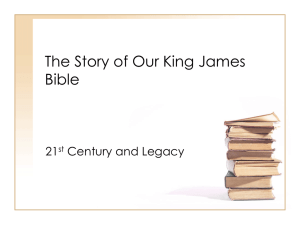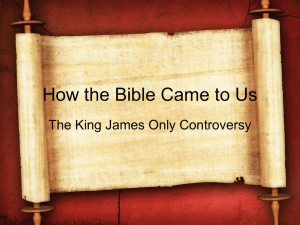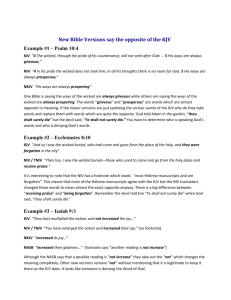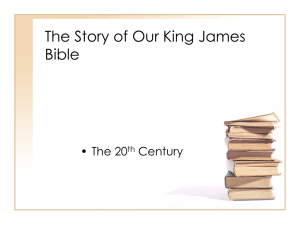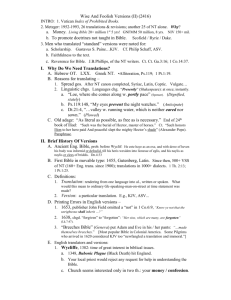Dumbing down or Sharpening Up? The Church`s
advertisement
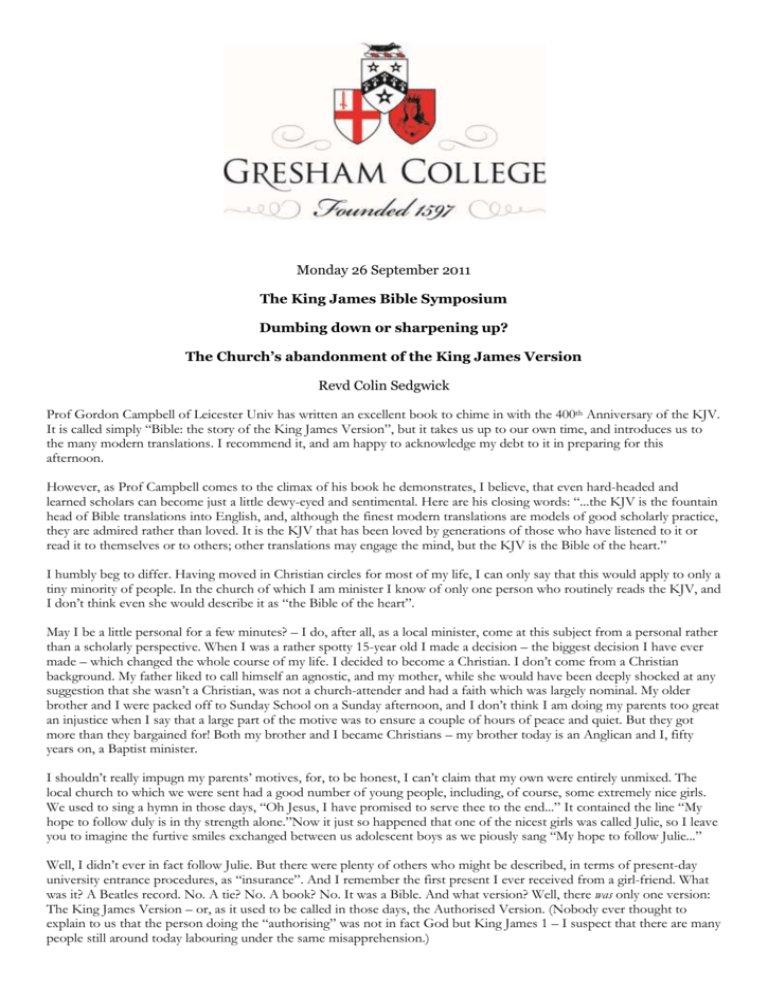
Monday 26 September 2011 The King James Bible Symposium Dumbing down or sharpening up? The Church’s abandonment of the King James Version Revd Colin Sedgwick Prof Gordon Campbell of Leicester Univ has written an excellent book to chime in with the 400th Anniversary of the KJV. It is called simply “Bible: the story of the King James Version”, but it takes us up to our own time, and introduces us to the many modern translations. I recommend it, and am happy to acknowledge my debt to it in preparing for this afternoon. However, as Prof Campbell comes to the climax of his book he demonstrates, I believe, that even hard-headed and learned scholars can become just a little dewy-eyed and sentimental. Here are his closing words: “...the KJV is the fountain head of Bible translations into English, and, although the finest modern translations are models of good scholarly practice, they are admired rather than loved. It is the KJV that has been loved by generations of those who have listened to it or read it to themselves or to others; other translations may engage the mind, but the KJV is the Bible of the heart.” I humbly beg to differ. Having moved in Christian circles for most of my life, I can only say that this would apply to only a tiny minority of people. In the church of which I am minister I know of only one person who routinely reads the KJV, and I don’t think even she would describe it as “the Bible of the heart”. May I be a little personal for a few minutes? – I do, after all, as a local minister, come at this subject from a personal rather than a scholarly perspective. When I was a rather spotty 15-year old I made a decision – the biggest decision I have ever made – which changed the whole course of my life. I decided to become a Christian. I don’t come from a Christian background. My father liked to call himself an agnostic, and my mother, while she would have been deeply shocked at any suggestion that she wasn’t a Christian, was not a church-attender and had a faith which was largely nominal. My older brother and I were packed off to Sunday School on a Sunday afternoon, and I don’t think I am doing my parents too great an injustice when I say that a large part of the motive was to ensure a couple of hours of peace and quiet. But they got more than they bargained for! Both my brother and I became Christians – my brother today is an Anglican and I, fifty years on, a Baptist minister. I shouldn’t really impugn my parents’ motives, for, to be honest, I can’t claim that my own were entirely unmixed. The local church to which we were sent had a good number of young people, including, of course, some extremely nice girls. We used to sing a hymn in those days, “Oh Jesus, I have promised to serve thee to the end...” It contained the line “My hope to follow duly is in thy strength alone.”Now it just so happened that one of the nicest girls was called Julie, so I leave you to imagine the furtive smiles exchanged between us adolescent boys as we piously sang “My hope to follow Julie...” Well, I didn’t ever in fact follow Julie. But there were plenty of others who might be described, in terms of present-day university entrance procedures, as “insurance”. And I remember the first present I ever received from a girl-friend. What was it? A Beatles record. No. A tie? No. A book? No. It was a Bible. And what version? Well, there was only one version: The King James Version – or, as it used to be called in those days, the Authorised Version. (Nobody ever thought to explain to us that the person doing the “authorising” was not in fact God but King James 1 – I suspect that there are many people still around today labouring under the same misapprehension.) I remember, as a new-born Christian, devouring this Bible hungrily – underlining verses, writing notes in the margin, soaking it up. Yes, there were rumours that there were other Bibles around. I remember the names of Moffat, Knox, Weymouth being mentioned, but the AV was indisputably the real Bible. We heard too of an Anglican active at that time in putting Paul’s letters and the gospels into modern English. His name was JB Phillips. But, we were warned, his versions were not really translations; they were paraphrases, and that was something very different. Three years later I made another life-changing decision. My main subject at school was English, and it was assumed that if I went to university that was what I would read. But I had already decided that I wanted to be a preacher – and if you were going to be a preacher, well, it had to be theology, didn’t it? And so I arrived at university, a very lamb among wolves, with O-level Latin, a mere smidgeon of Greek, hastily imparted to me in a matter of weeks by the Latin teacher, and just about nothing of ancient history or the classics. It was quite frightening, but all I could do was take a deep breath and plunge headlong in. It reminds me now of a comment made by my wife when she was expecting our first child: she described pregnancy as like a parachute jump – once you’ve started, there’s no going back. And getting involved in scholarship, even at that very elementary level, is somewhat similar. Once you have started grappling with the biblical languages and questions of authorship, dating, interpretation, etc etc you can never regain your previous innocence – you might just as well try to put the toothpaste back in the tube or to unscramble eggs. It cannot be done. I speedily learned that questions about English translations were pretty much irrelevant now, as I sweated at my little desk over my basic introduction to NT Greek. I remember receiving what was intended as a word of encouragement from one of the most frighteningly learned and erudite people I have ever met, Dr Austin Farrer: “Do remember, Mr Sedgwick, that languages are not learned with the mind; they are absorbed through the pores...” I know what he meant, but I’m not sure it was quite as simple as that. Perhaps my pores just weren’t quite porous enough. Fast-forward five more years, and I am ordained as a Baptist minister and come to my first church. Another big decision – to persuade the church it was time to buy pew-Bibles. Relying on people to bring their own, a once-common practice, was unrealistic, and the sight of people sitting with glazed eyes while a perhaps quite difficult passage from Paul was read, was intolerable. It was quite literally a waste of time. But if we did buy Bibles, what version should they be? I plumped for the Revised Standard Version. There was, of course, resistance to abandoning the KJV. “I think we should stick with the original”, I was told by a stalwart of the church, a fine Christian man – who had obviously never learned that that not only was the KJV not “the original”, but that it was not even the first English translation; many had gone before. (Indeed, the KJV translators were very clear that they were not seeking to produce a new translation but simply a revision. We aim, they said, “not to make a new translation but to make a good one better”.) Well, I prevailed in persuading the church thus, and, shocking though this may seem, I have virtually never opened a KJV since. Indeed, even the RSV didn’t last that long, for, updated though it no doubt was, the big step had not been taken of replacing the thees and thous with you. (Archaisms such as these, incidentally, were archaic even to the translators of the KJV.) The New International Version came along and became, I believe, one of the most popular versions, especially in the largely evangelical circles in which I moved and still move. And so to the question in the title of this lecture: Was this act of abandoning the KJV irresponsible? Were we guilty of betraying our heritage? Was it a case of dumbing down? Or were we in fact showing good sense in sharpening up our act? When I use the word “we” I do of course include the church at large, of all the various denominations. I think at this point I can do no better than read a column I contributed to the Times in February this year... [“Gloriously unusable”] I mention there that there are two main things that have to be borne in mind when it comes to translations: accuracy and intelligibility. As regards accuracy, the KJV (so they tell me: I am no authority) stands up well. But scholarship moves on very fast, and inevitably renders some translations obsolete, or at least open to new possibilities. Let me suggest just one example. An interesting change that has occurred in many modern translations is in the Lord’s Prayer with the words “lead us not into temptation”. Even a person with scant understanding of scholarly matters might find that a little perplexing if it were not so familiar: would a good God, a God who is “our Father”, ever lead us into temptation? Like leading an alcoholic intro a pub. Why would he do such a thing? What many people cannot be expected to understand – how should they? they haven’t had the advantage of studying this at any kind of serious level - is that the Greek word used here, peirasmos, is infuriatingly ambiguous. It may mean temptation in the moral sense – enticement to do evil – or it may mean “testing” in a neutral sense. True, we cannot say that the KJV translators were actually inaccurate here – their translation is technically possible. But further scholarly consideration of that ambiguity seems to have tipped the scales the other way: “Do not bring us to the time of trial” (NRSV); “Do not bring us to hard testing” (LB); “Do not bring us to the test” (NEB); “Don’t bring us to the great Trial” (Tom Wright). In this respect the KJV would appear to have yielded the field to the modern translations. The problem with any translation is that it becomes “frozen”. Like the telephone directory, the moment it is published it is out of date somewhere. And this is why, even though the recent avalanche of Bible translations may be rather bewildering – Scouse Bibles, Cockney Bibles, Youth Bibles, Women’s Bibles, Men’s Bibles, you name it, it will be there somewhere – they are nonetheless to be welcomed. So much for the question of accuracy. It is, of course, in the area of intelligibility that real problems arise. Language changes to such a degree that even words in use thirty years ago are now out of date and unintelligible. I read recently of a revision of a major dictionary that has decided to jettison certain words – “charabanc” springs to mind – because they fallen out of use. Sad? Yes, indeed, but necessary; you can’t have a working dictionary that expands ad infinitum. Ask anyone over forty what a mouse is, and they will probably have no hesitation in describing a small four-footed rodent. But ask a child under fifteen and you are likely to receive a very different answer: the gadget I use to work my computer. At what point does that latter meaning become the primary meaning of the word? Even as a very young Christian I remember being puzzled by simple ambiguities in the KJV text. “Drink ye all of it,” says Jesus to his disciples at the last supper. And I used to wonder what might happen to me if I left some? “All of you, drink this” clears it up nicely. Paul tells the Christians of Rome that he has long wanted to visit them, but “was let hitherto”. He was “let”? Well, what was the problem then? Let him get on with it. But the Greek word koluo means precisely the opposite of what we now mean by let (setting apart the legal phrase “without let or hindrance”): it means “prevented”. These are no doubt trivial examples. But they illustrate the great difficulty involved in seeking to enable the ordinary “man or woman in the pew” to understand the Bible. Good modern translations are vital. Indeed, the fact that some years ago a New King James Version (NKJV) appeared on the market (though I personally have never met anyone who uses it) seems a tacit acceptance that the original KJV is no longer what is needed. But of course the literary defenders of the KJV (I’m not speaking now of the extreme evangelical and fundamentalist wings, especially prominent in America) rest their case not so much on matters of accuracy or even intelligibility, but on the undoubted beauty of much of its language. It is the stylistic factor that predominates. Much is made, and quite rightly, of the many memorable phrases the KJV has bequeathed to the English we still use, often without realising it, today. But even here we need to be careful. In many such instances, as the KJV translators were perfectly happy to recognise, the credit is barely due to them. They knew very well that they were climbing on the shoulders of some true giants. Take, for example, the famous words of Jesus in the garden of Gethsemane: “Watch and pray, that ye enter not into temptation: the spirit indeed is willing, but the flesh is weak”. Wonderful KJV! But now go back nearly a hundred years, to the translation of William Tyndale. How does he render this verse? “Watch and pray, that ye fall not into temptation. The spirit is willing, but the flesh is weak”. A difference of just two words. Or what about the words of old Simeon as he cradles the infant Jesus in his arms? KJV has: “Lord, now lettest thou thy servant depart in peace, according to thy word”. And what does Tyndale give us? “Lord, now lettest thou thy servant depart in peace, according to thy promise”. A difference – and surely not a very significant one - of just one word. Any suggestion that the KJV was ushering into our language all these wonderfully memorable phrases is simply mistaken. Prof Campbell offers the startling observation: “... it has been estimated that 83% of the KJV published in 1611 derives from Tyndale, either directly or indirectly through other Bibles”. That statistic is worth serious contemplation. I’m afraid I haven’t read Prof David Crystal’s book “Begat”, but I believe that this too redresses the balance somewhat in this area. To say all this is not, of course, in any way to discredit the KJV or its translators. Most certainly not. It is simply to point out that the KJV has been the recipient of much adulation (adulation which, I repeat yet again, it never wanted or asked for) to which it really has no right – that the regular statements we hear about the profound influence of the KJV upon our language are seriously overblown. Suppose King James had in fact never encouraged this version to be produced? Would all these memorable phrases have faded into obscurity? It seems highly unlikely. I speak, of course, as a practising Christian (horrible phrase, but you know what I mean). And so I find welcome support in those among the Christian intelligentsia who have seen fit to comment on this misguided emphasis on the Bible as literary treasure as opposed to sacred text. Some have found it intensely irritating. Listen to CS Lewis, that crusty old iconoclast, on the matter of the KJV’s “rhythms” and “cadences”: “I am not at all sure that resemblance in rhythm, unless supported by some other resemblance, is usually recognisable. If I say [typical Lewis, this!] ‘At the regatta Madge avoided the river and the crowd’ would this, without warning, remind you of ‘In the beginning God created the heaven and the earth’?” (Lewis, of course, has contrived a sentence exactly equivalent to Genesis 1:1 in both word-number and syllables per word.) In other words, the rhythm is inherent in the meaning of the words: the fact that exactly the same rhythm applies to something majestic, as in Genesis 1, and to something merely commonplace, as in Lewis’ illustration, is purely coincidental. Lewis, in fact, energetically opposes any notion of “The Bible designed to be read as literature”: it is, he says, “not merely a sacred book but a book so remorselessly and continuously sacred that it does not invite, it excludes or repels, the merely aesthetic approach. You can read it as literature only by a tour de force. You are cutting the wood against the grain, using the tool for a purpose it was not intended to serve.” Putting it very simply, Lewis says, “I cannot help suspecting... that those who read the Bible as literature do not read the Bible at all”. Richard Dawkins, the Prince of Wales and the late Michael Foot are names that come to mind, in spite, in two cases, of their atheism or agnosticism, as lamenting the demise of the KJV, or at least being keen on its preservation. Well, rather that the Bible be read “as literature” than not read at all – who knows when someone might be converted! But, if Lewis is right, they are missing the very point of reading it in the first place – rather like people who go to watch a thriller and come away only able to enthuse about the camera work and the scenery. TS Eliot is equally scathing: “Those who talk about the Bible as a ‘monument of English prose’ are merely admiring it as a monument over the grave of Christianity... The Bible has a literary influence upon English literature not because it has been considered as literature, but because it has been considered as the report of the Word of God”. My wife and I, if we are looking for a day out, sometimes visit one of those “living” or “working” museums. It’s a nice experience: you can wander around a re-created village and watch, say, a blacksmith at his forge, a woman with a long dress and pinafore baking at a primitive oven, a farmer feeding his pigs. If you feel like an ice cream you can stop a boy on an ancient bike, dressed in knickerbockers and corduroy cap, who will offer you the contents of a big square box on his handle bars. Yes, they’re good places, these living museums. But would you want to live permanently in one? No running water...? no electricity...? The problem with those who value the Bible largely for its literary value is that their model of the church is all wrong: they may not realise it, but in effect they see it as living museum rather than as living community: nice for a visit, nice to sentimentalise over, but of no great practical value. Does this mean there is no place for the KJV? No: but, from the point of view of the believing Christian, that place must be seen for what it is: the realm of the scholar, the aesthete, the museum curator. The KJV is a wonderful book, but it is not a working book. And the church, if it is anything at all, is a working body, people coming together out of a shared faith in the events to which the Bible, and the Bible alone, bears testimony. Of course, someone may very well say, “Well, it’s now forty or more years since this wholesale act of abandonment took place. But look what’s happened since! Can you honestly claim that it has achieved anything worthwhile? Don’t we keep hearing statistics that show that the church is shrinking fast? Shouldn’t all this modernisation have led by now to a resurgence of interest in the church and in Christian things?” A fair point. One, indeed, which deserves another lecture to itself. All I would say at this point is that the numerical decline in the church is attributable to a whole range of factors - the increasing secularisation of our society - the worship of the great god materialism - being very much to the fore. And while it would of course be impossible to prove this, there is no doubt in my mind that things would be very much worse if the church had clung stubbornly to the KJV. I might just add also that if we look around for churches which are bucking this modern trend of decline they are very likely (I don’t say absolutely necessarily) to be the churches that have whole-heartedly embraced the modern idiom, not only in the Bibles they use but also in their music, their dress codes and all sorts of other things. (If I may digress for a moment, I cannot resist commenting that dismissive remarks about “happy-clappy” churches are often grossly unfair. I do not think of myself as a “charismatic”, certainly not a happy-clappy, but I can only respect the fact that many of these churches are the ones making meaningful contact with the drug addicts and gang-members. Often it is these church members who are out in the town centres in the early hours of a Saturday morning as “street pastors”, picking drunken youngsters out of the gutters, giving flip-flops to girls who can no longer stand on their spindly heels, and offering soup to drink and perhaps a shoulder to cry on. It isn’t all froth and bubble...) End of digression. So... was the church’s abandonment of the KJV an act of dumbing down, or an exercise in sharpening up? Everything hinges on whether you view the Bible as literary artefact or as inspired scripture. You won’t be in any doubt as to my view of the matter. Looking back now, there seems to have been an absolute inevitability about the process – the wonder really is that the church stayed with the KJV so long. I yield to no-one (as they say) in my admiration for the KJV and those who produced it. Thank God for it, and for them. But let’s not fool ourselves that it remains a practical working Bible today. ©Colin Sedgwick., Gresham College 2011
